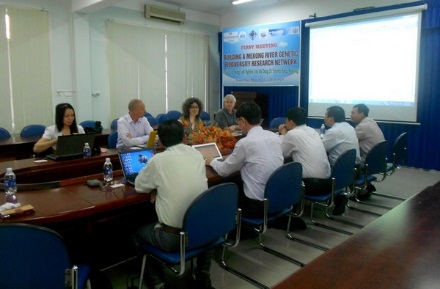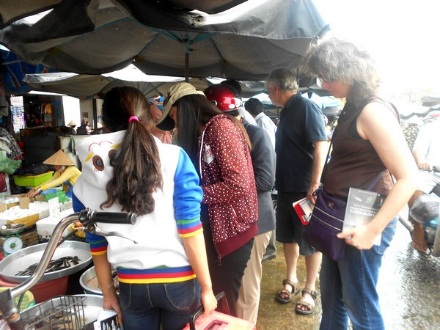Building a Mekong River genetic biodiversity research network
PI: Vu Ngoc Ut (vnut@ctu.edu.vn), Can Tho University, with co-PIs Dang Thuy Binh, Nha Trang University; Chheng Phen, Inland Fisheries Research and Development Institute (IFReDI); So Nam, Mekong River Commission; and partner to be designated in Laos
U.S. Partner: Kent Carpenter, Old Dominion University
Project Dates: December 2014 to November 2017
The Mekong River Basin (MRB) represents a global hotspot of aquatic biodiversity, second only to the Amazon River in terms of total fish species richness. The purpose of this project will be to initiate a network of scientists working in the MRB whose coordinated action will lead to a systematic sampling of populations and species to provide a set of robust tests of biogeographic origins of MRB biodiversity through advanced genomics and comparative phylogeography. Specifically, the research team will aim to examine a set of synchronously diverging co-distributed taxa to determine whether the genetic connectivity or barriers to gene flow are determined by processes relating to ecological (relatively recent) or evolutionary (geological) time scales. Directionality of gene flow will be tested to determine if connectivity is predominantly governed by larval dispersal through prevailing fluvial flow, or whether fish movement patterns potentially reverse this natural tendency. Shared phylogeographic patterns among taxa will be examined together with both present ecological and geological processes to corroborate likely causality in a natural experimental framework.
A significant developmental impact of this project will be the establishment of a network of scientists, managers, and conservationists interested in using genetics to better understand and manage the biodiversity of the MRB. The primary partner will be the Mekong River Commission, which previously initiated population genetic data collection for important species, and the aim will be to strengthen and expand this initiative. The implementation of the project will forge and strengthen long-term collaborative research ties through mutual design and implementation of a comparative population genetic project. Since most of the participants do not have extensive experience in next-generation sequencing and advanced genomic analysis, another proximate development impact will be training of aquatic researchers across the MRB in this methodology. Population genetic data will be systematically collected as a result of the establishment of the network, and data will be analyzed for information relative to resource management and biodiversity conservation. The data will also be used as the basis for establishing a long-term genetic monitoring system for aquatic resources and integrity of genetic biodiversity. The benefits of the collected data will include: 1) the ability to estimate and monitor effective population size of exploited stocks; 2) evaluation of spatial stock structure for fisheries management, for assessment of fragmentation due to damming, and to enhance adaptive mitigation and management in anticipation of hydrological changes from climate change and damming; 3) baseline information on genetic variability collected during this study will allow monitoring of genetic integrity that may be influenced by fishing, stock enhancement (release of hatchery reared individuals), and accidental release from aquaculture; 4) baseline information on genetic variability collected during this study that will allow monitoring of genetic variation as potential for biological adaptation and resilience to changing environmental conditions; and 5) establishment of a genetic data repository in collaboration with the Mekong River Commission for data sharing.
Summary of Recent Activities
The project began with a meeting organized at Can Tho University, Vietnam, on March 23-24, 2015. Participants taking part in this meeting included U.S. partner Kent Carpenter (Old Dominion University), PI Vu Ngoc Ut (Can Tho University), co-PI Dang Thuy Binh (Nha Trang University, Vietnam), co-PI So Nam (Mekong River Commission, Cambodia), co-PIs Chheng Phen and Ou Sary (IFReDI, Cambodia), and USAID Regional Development Mission for Asia representatives Teresa Leonardo and Brandon Sitzmann. The meeting began with a general introduction of the project objectives and activities and then moved on to a discussion of the sampling protocol and species to be selected for sampling. The participants developed a timeline for their first year of activities and discussed how to identify additional partners in Laos and Thailand. After one day of work, they had completed the standard sampling protocol and a list of fish species for sampling. Eleven fish species will be sampled for genetic analysis and must meet eight criteria set by the team. On the second day of the meeting, all members of the team took part in a survey and sampling at fish markets in Can Tho City.
In the months to come, researchers from Can Tho University will sample at two locations along two main branches of the Mekong River at Long Xuyen and Vinh Long, and their colleagues from Nha Trang University with collect samples at one site (Krong No) in the highland area of Vietnam that connects with the Mekong River. In Cambodia, two sites were chosen: Tonle Sap Lake and Stung Treng. In September 2015, the group will organize a two-week training course on NextGen sequencing at Nha Trang University. Each partner institution will send two or three staff members to participate in the course, which will be taught by an expert being invited from the United States.

Kick off meeting at Can Tho University

Sampling at Local markets at Can Tho City
